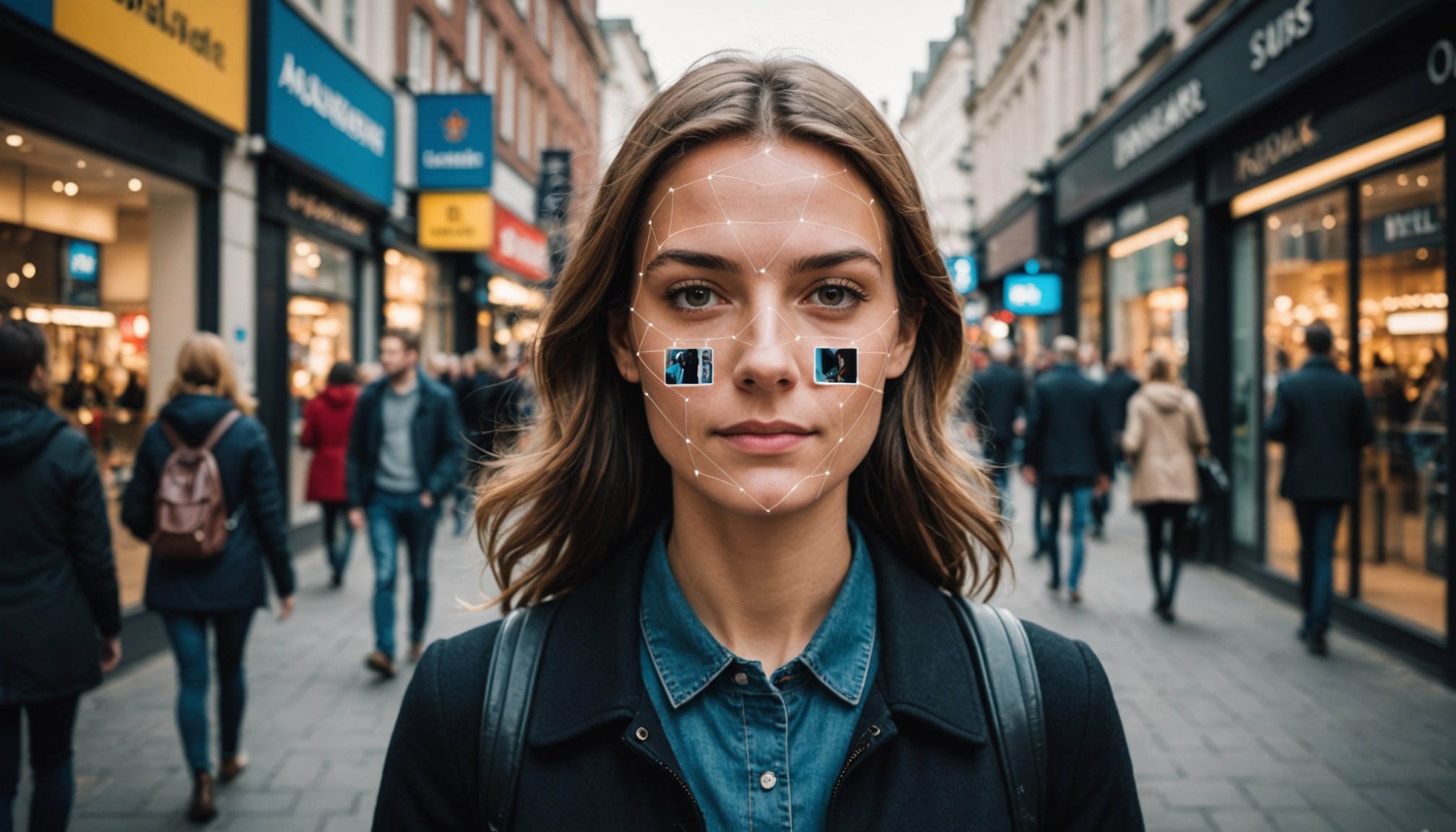Understanding the Legal Landscape of Facial Recognition Technology in UK Retail: Impacts and Considerations
The Rise of Facial Recognition Technology in Retail
Facial recognition technology (FRT) has rapidly transitioned from a futuristic concept to a practical tool widely adopted in various sectors, including retail. In the UK, retailers are increasingly using FRT to enhance security, optimize customer service, and reduce theft. However, this widespread adoption has also raised significant legal, ethical, and human rights concerns.
Key Applications in Retail
- Security and Crime Prevention: FRT is used to identify and deter habitual offenders. For instance, Project Pegasus, a police operation supported by major retailers, biometrically matches CCTV images of shoplifters with those in a national police database.
- Customer Service: Retailers use FRT for personalized marketing and to improve customer experiences. This includes analyzing customer behavior and preferences without directly identifying individuals.
- Operational Efficiency: FRT can be integrated into various retail operations, such as time and attendance systems, to streamline processes and reduce administrative burdens.
Legal Implications and Compliance
The use of FRT in UK retail stores is governed by a complex legal landscape, primarily centered around data protection, privacy, and human rights.
Also to see : Exploring the Legal Landscape: Cryptocurrency Transaction Compliance for UK Businesses
Data Protection and Privacy Concerns
The General Data Protection Regulation (GDPR) and the Data Protection Act 2018 are the cornerstone legislations governing the use of personal data in the UK. Here are some key points to consider:
- Biometric Data: Facial recognition involves collecting biometric data, which is classified as special category data under GDPR. This requires higher levels of protection and explicit consent from individuals unless an alternative legal basis can be established.
- Consent and Transparency: Retailers must ensure that their use of FRT is lawful, fair, and transparent. This includes informing individuals about the collection and use of their biometric data and obtaining their consent.
- Bias and Discrimination: Early facial recognition systems have shown racial and gender bias, which raises concerns about fairness and potential misuse. Retailers must ensure that their FRT systems are trained on diverse datasets to reduce bias.
Regulatory Frameworks
- Information Commissioner’s Office (ICO): The ICO has issued guidelines to ensure the responsible use of FRT in compliance with GDPR and the Data Protection Act 2018. Retailers must demonstrate a lawful basis for processing biometric data and implement appropriate safeguards to protect individuals’ rights.
- Protection of Freedoms Act 2012: This act regulates the use of surveillance cameras in public spaces, including facial recognition technology. The Surveillance Camera Code of Practice sets out guidelines for the use of these technologies to ensure they are used proportionately and transparently.
Ethical Concerns and Public Trust
The ethical use of FRT is crucial for maintaining public trust and ensuring that individual rights are respected.
Additional reading : Essential Legal Obligations for UK Businesses Under the Competition Act 1998: A Comprehensive Guide
Privacy and Surveillance
- Mass Surveillance: The use of live facial recognition (LFR) technology raises concerns about mass surveillance and the potential for misuse of sensitive biometric data. Retailers must balance the benefits of FRT with ethical data protection practices.
- Consent in Public Spaces: FRT often operates in public spaces, complicating the acquisition of consent. Retailers must ensure that individuals are aware of the use of FRT and have mechanisms in place for individuals to opt-out if desired.
Bias and Fairness
- Algorithmic Bias: Studies have shown that early FRT systems exhibited racial and gender bias. Retailers must use FRT systems trained on diverse datasets to reduce bias and ensure fairness.
- Transparency and Accountability: Retailers should prioritize transparency and accountability in algorithm design and deployment. This includes regular audits and testing to ensure that FRT systems are fair and unbiased.
Case Studies and Practical Insights
Project Pegasus
Project Pegasus is a notable example of how FRT is being used in collaboration with law enforcement to combat retail crime. This project involves sharing CCTV footage with police forces to biometrically match images with those in a national police database. While this initiative has shown promise in identifying offenders, it also highlights the need for strict safeguards and oversight to ensure ethical use.
Retailer Best Practices
Here are some practical insights and best practices for retailers using FRT:
- Opt-in Programs: Retailers can consider opt-in programs that allow customers to voluntarily participate in FRT initiatives, ensuring that their consent is obtained and respected.
- Anonymized Data: Using anonymized or aggregated data for trend analysis and customer insights can help retailers leverage the benefits of FRT without directly identifying individuals.
- Collaboration with Law Enforcement: Retailers should collaborate with law enforcement agencies to ensure that their use of FRT is consistent with broader public safety objectives. This includes sharing information and best practices to promote responsible and ethical use of FRT.
Regulatory Recommendations and Future Trends
Calls for New Legislation
The House of Lords Justice and Home Affairs Committee has called for new laws to ensure the safe and ethical use of FRT by private companies. The committee emphasizes the need for general principles and minimum standards for the use of new technologies, particularly in crime prevention.
International and EU Regulations
- EU AI Act: The EU AI Act is set to significantly impact companies developing or using biometric AI products within the European market. This act aims to reduce the risk of harms associated with AI while stimulating innovation.
- British Standard BS 9347:2024: This new standard provides a code of practice for the ethical use and deployment of FRT in video surveillance-based systems, recommending best practices for UK retailers to mitigate risks associated with FRT use.
Table: Key Legal and Ethical Considerations for FRT in UK Retail
| Consideration | Description | Relevant Legislation/Regulation |
|---|---|---|
| Data Protection | Ensure lawful, fair, and transparent use of biometric data. Obtain explicit consent unless an alternative legal basis is established. | GDPR, Data Protection Act 2018 |
| Bias and Discrimination | Use FRT systems trained on diverse datasets to reduce bias. Regular audits and testing to ensure fairness. | GDPR, ICO Guidelines |
| Consent in Public Spaces | Inform individuals about the use of FRT and provide mechanisms for opting out. | GDPR, Protection of Freedoms Act 2012 |
| Surveillance and Privacy | Balance the benefits of FRT with ethical data protection practices. Ensure transparency and accountability. | GDPR, Protection of Freedoms Act 2012 |
| Collaboration with Law Enforcement | Ensure use of FRT is consistent with broader public safety objectives. Share information and best practices. | Protection of Freedoms Act 2012, Police Use of FRT Guidelines |
| Regulatory Compliance | Demonstrate compliance with relevant laws and regulations. Implement appropriate safeguards to protect individuals’ rights. | ICO Guidelines, Surveillance Camera Code of Practice |
Quotes and Insights from Experts
- Lord Foster of Bath: “The scale of the shop theft problem within England and Wales is totally unacceptable and action, like that underway in the Pegasus scheme, is vital and urgent. There’s no silver bullet. But, if adopted, the recommendations in our report should help tackle the problem and help keep the public and our economy safer.”
- Paul Garrard, Co-op Group: “Although some police forces will take the compiled footage and compare it with photos contained in the Police National Database, it is not currently standard practice for police to automatically check the images provided against the database.”
- Anekanta®AI: “By adopting Responsible AI practice, businesses can unlock the transformative power of AI technology while minimizing risks and maintaining stakeholder trust. Our AI assurance frameworks are expertly designed to assess the safety of high-risk AI development and deployment.”
The use of facial recognition technology in UK retail stores presents both opportunities and challenges. While FRT can significantly enhance security and customer service, it also raises critical legal, ethical, and human rights concerns. Retailers must navigate a complex legal landscape, ensuring compliance with data protection laws, transparency, and fairness in algorithm design, and maintaining public trust.
By adopting a responsible and transparent approach, retailers can leverage the benefits of FRT while safeguarding individuals’ privacy and rights. As the technology continues to evolve, ongoing developments in AI and machine learning will play a crucial role in addressing ethical challenges and unlocking new possibilities for the use of facial recognition technology.
Practical Advice for Retailers
- Conduct Regular Audits: Regularly audit FRT systems to ensure they are fair, unbiased, and compliant with relevant regulations.
- Obtain Informed Consent: Ensure that individuals are fully informed about the use of FRT and provide clear mechanisms for opting out.
- Collaborate with Authorities: Work closely with law enforcement agencies to ensure that the use of FRT aligns with public safety objectives.
- Implement Ethical AI Practices: Adopt responsible AI practices, such as those recommended by Anekanta®AI, to minimize risks and maintain stakeholder trust.
By following these guidelines and staying abreast of regulatory developments, retailers can harness the potential of facial recognition technology while respecting the rights and privacy of their customers.












